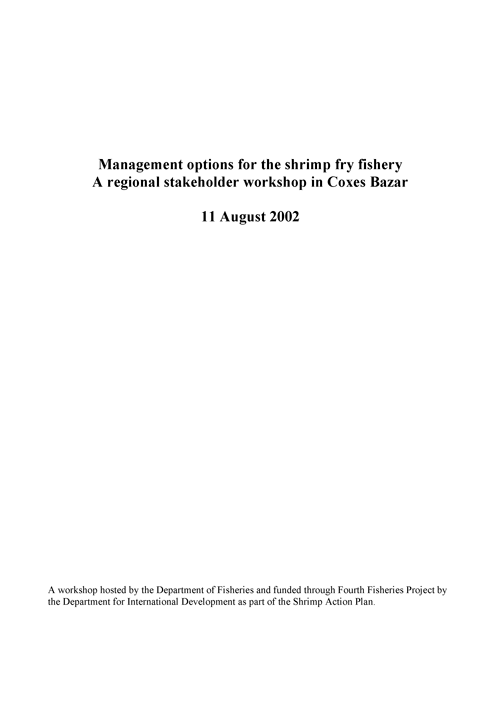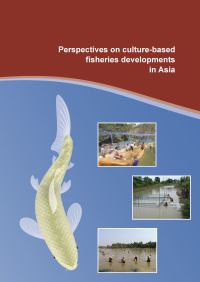Management options for the shrimp fry fishery: A regional stakeholder workshop in Coxes Bazar
19 March 2004 | Department for International Development | 1536 Downloads | .pdf | 300.93 KB | Bangladesh, Better management practices, Food Security, Safety and Certification, Governance and Policy, Hatchery and nursery, Livelihoods, gender and social issues, Shrimp, Education and Training
In February 2002, the MOFL decided to place the enforcement of the fry collection ban into abeyance pending further review of how the resource and biodiversity could be conserved at the same time as protecting the livelihoods of 400,000 fry collectors. A Shrimp Action Plan for the period April - September 2002 was drawn up to identify trends impacting on distribution and growth in the shrimp sector, and to explore alternative models for the management of fry resource and to assess their social, institutional and economic implications.
This was jointly prepared in early February 2002 by representatives from DOF, DFID, FFP, Global Environmental Facility (GEF), BWDB and Environmental Geographic Information System or EGIS. A position paper will be presented to Secretary in September establishing options for managing the fry resource and the economic, social and environmental costs and benefits.
The Action plan provides for a full consultative process with development agencies (at local level and sector ministry level), private sector and Donors. This has been ongoing since April 2002. The aims of this workshop were: to identify trends impacting on the growth and distribution of the shrimp sector, and to engage stakeholders from civil society, Government and the private sector in identifying and agreeing on appropriate management options for the wild shrimp fry fishery in south west Bangladesh. The workshop identified a number of key priority issues and challenges specifically relating to the following areas: fry collection management, alternative livelihoods for fry catchers, appropriate training and awareness for fry catchers, the role of hatcheries and the potential for certification along with identification of key policy issues relating to the supply of shrimp fry.
The workshop took place in Coxes Bazar in south-east Bangladesh on 23rd July 2002. In this part of Bangladesh, the ban on fry collection was not enforced to any great extent due to: political pressure from wild fry traders, low awareness of the ban, a lack of alternative income opportunities for fry catchers, a continuing demand for wild fry from farmers and inadequate resources to enforce the ban. Shrimp fry are harvested from the coastal areas extending from Tecnaf in the south through to Chittagong. Coxes Bazar is the main centre for hatchery produced Bagda, there are 46 hatcheries in this area. Despite the plentiful supply of hatcheries in Coxes Bazar, most local shrimp farmers in this region still use wild fry.
Copyright, all rights reserved.

